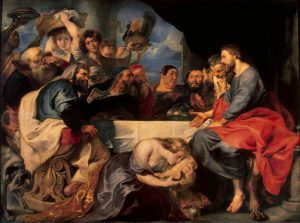
https://upload.wikimedia.org/wikipedia/commons/5/58/Rubens-Feast_of_Simon_the_Pharisee.jpg
Mid-week Reflection (John 12:1-8) [29th July 2020]
The biblical fragment that I chose as the basis for this reflection solves one of the most difficult and most common confusions in the lives of believers: what to do and when; what is the priority? Jesus, with his disciples, is on his way to Jerusalem, where he will be crucified. He stops to visit his friend Lazarus, whom he raised from the dead, and his sisters Martha and Mary. My intention is not to stop to explain Mary’s gesture, but to invite you to reflect a little on what Jesus says to Judas.
Judas considers that Mary made a great waste using such an expensive perfume to anoint Jesus’ feet. Although his biggest concern is not the poor, but to have more money in his bag to steal from, he uses them only as a pretext. Jesus’ answer is simple, but also surprising: “You always have the poor with you, but you do not always have me” (John 12:8). This answer does not mean that the poor occupy a secondary place in Jesus’ concern. Needless to say, his very mission begins with proclaiming the good news for the poor, the underprivileged (Luke 4:18-19).
Mary’s gesture does not deny or neglect the debt to the poor, but at that moment Mary pays a specific debt, a special debt, only at that moment. The duty to care for the poor is one that must remain a constant in the lives of Jesus’ disciples. However, Jesus’ disciples have special duties at special times. This is about the relationship between duty at any time and duty just now. I called duty to the poor duty at any time because it is and must be a constant in the life of the disciples, as it was a concern in the mission of Jesus. I have called duty just now those bonds or services which the community of disciples must perform at special times, without neglecting the duty at any time. Here we find one of the biggest problems of our day: the confusion between the ordinary and the extraordinary, or simply the denial that there are special moments in which our attention must have a different orientation than normal.
Our life of faith must have at its centre the concern for the poor. That must be a duty at any time. The same life of faith has special moments of celebration, of expression that are extraordinary, special. Among these are our celebrations on Sundays or on various holidays, or other special occasions, when we gather as a community and celebrate our faith. These are special times and ways to be with Jesus, just as caring for the poor must be a common way to be with Jesus.
To invoke the duty at any time as an excuse for not to fulfil the special duty, or the duty just now it is the same thing that Judas did. But most of the time it is just an excuse and nothing more, without any special interest, as Judas had. It is often a sign of a weak faith or communion with those who have the same faith.
It is difficult to maintain a balance between the duty at any time and the duty just now, or that which must be fulfilled at certain times. It’s the same thing as keeping the faith alive by sharing it with others and motivating that we always have something more important to do than being together to worship. The maximum expression of Jesus’ communion with the disciples, his friends was that they had supper together at special times, prayed together at special times. This does not negate the special care for the poor, the duty at any time. Being with friends is a duty just now. That expresses that we are still friends. Being with the faith community shows that we are still its members, we are the same family. This is what happens when we gather to celebrate and pray together, in our places of worship, our churches. It is a duty just now.
(Revd. Bernard Noghiu, Southend on Sea – 29th July 2020)
